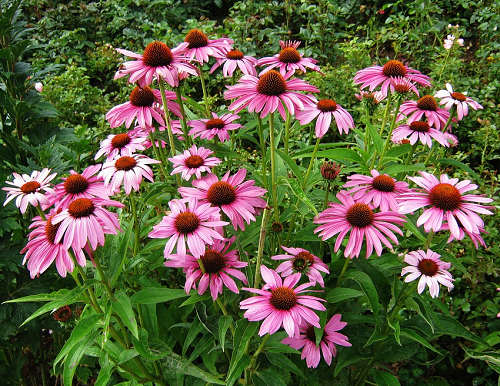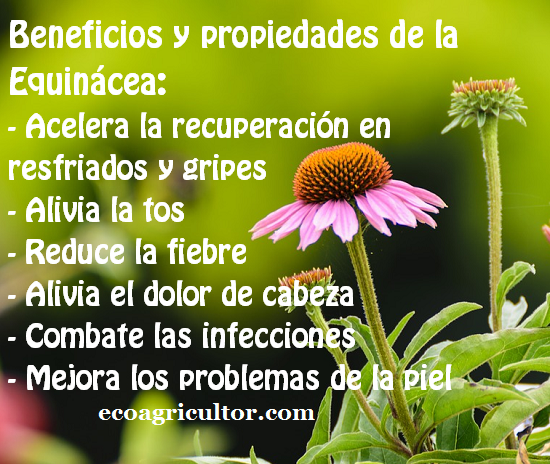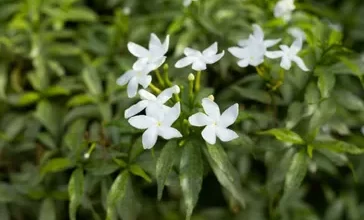Echinacea, properties and benefits of this medicinal plant

What is echinacea? Echinacea, Echinacea purpurea , Echinacea angustifolia and Echinacea pallida , is a medicinal plant native to North America where it was already used by native populations within their popular medicine to maintain and regain health.
Although this plant is known for its use in colds or flu and in improving defenses, echinacea has more applications: it reduces fever, takes care of the health of teeth and gums, fights Candida albicans and improves cases of fatigue. .
Echinacea belongs to the botanical family Asteraceae, like other medicinal plants such as Arnica , Chamomile , Stevia , Milk Thistle , Calendula or dead flower , and vegetables such as Artichoke or Alcaucil and Lettuce .
In this article you will know the properties of echinacea and what medicinal action it has, the benefits of echinacea and what this plant is for, how to prepare and take echinacea and finally what are the contraindications of echinacea and when it should not be taken .
Echinacea properties
Active principles such as quercetin and rutin (both flavonoids), free phenolic acids, glycoproteins, polysaccharides or essential oil with borneol, are some of the compounds that give echinacea its medicinal properties.
These active components have action:
- Immunostimulant
- Antibacterial
- Antiviral
- Cough suppressant
- Healing
- Anti-inflammatory
- Febrifuge
- Antifungal
- Anti-migraine
What is echinacea good for? Echinacea benefits
 – It can help you mitigate symptoms and speed up recovery in cases of colds or colds and flu.
– It can help you mitigate symptoms and speed up recovery in cases of colds or colds and flu.
– For otitis or ear infection it can be helpful
– Echinacea is used in cases of respiratory tract infections
– Fight headaches
– May be useful against urinary tract infections
– Echinacea is used for sinusitis and other respiratory ailments such as bronchitis.
– Traditionally it has been used to combat fatigue
– It is beneficial in case of sore throat and cough.
– By making mouthwashes with echinacea we can improve our oral health
– Reduces fever
– This medicinal plant can help fight candida infection
– Echinacea facilitates tissue regeneration and wound healing
– Applied externally, echinacea can improve wounds and skin problems such as psoriasis and eczema.
– Echinacea is also used topically (externally) for cases of insect bites and snake bites.
– It can be useful applied externally to combat cases of acne
.
How to prepare and take echinacea
The roots and flowering tops are mainly used for medicinal purposes.
We can prepare echinacea mainly in two ways:
- Echinacea infusion: put 1 teaspoon of dried plant, add 200 ml of water, cover it and let it rest between 4 and 6 minutes. Then it is strained and drunk little by little when it is no longer so hot.
- Echinacea tincture: it is a very practical way to always have the properties of echinacea at hand and it is taken very easily, you just have to dilute it in water.
There are two ways to use echinacea:
- Internal use : it is prepared in infusion with a teaspoon of the dried plant and 200 ml of very hot water. Let stand 5 minutes, strain and drink. In addition to the infusion of echinacea we can also make tincture of echinacea. It is very practical because in this way we always have the properties of echinacea available, since the tincture lasts for a year. I leave you the link to my article to know how to make echinacea tincture .
- External use : you can prepare it as an infusion and apply it with a clean gauze on the area to be treated, as if it were a tonic.
Contraindications of echinacea
Medicinal plants should be taken under the supervision of a herbalist, the expert in medicinal plants and under medical supervision. Based on your medical history, your pathologies and treatments and depending on your needs, they will be able to tell you in what dose, for how long and in what way it is better for you to take (or not) echinacea.
In general, the consumption of echinacea is not recommended for some cases:
- It is not advisable to take it for more than 8 weeks in a row.
- It is not safe to consume echinacea during pregnancy and lactation
- Its use is contraindicated in people with autoimmune diseases.
- People with liver problems
- In people with diabetes, as it can cause hypoglycemia
- Echinacea should not be used in children under 12 years of age
In summary….





![Photo of Stevia: [Planting, Care, Irrigation, Substrate and Pests]](https://www.complete-gardening.com/wp-content/uploads/2022/08/stevia-planting-care-irrigation-substrate-and-pests-390x220.jpg)